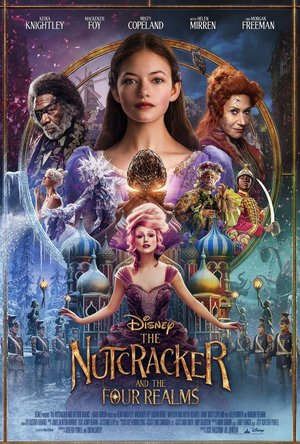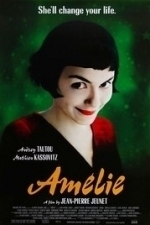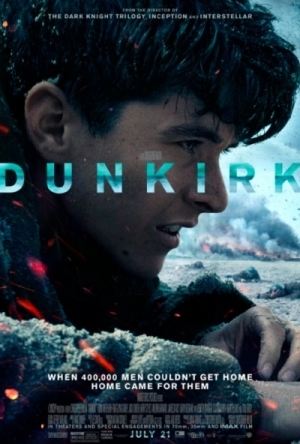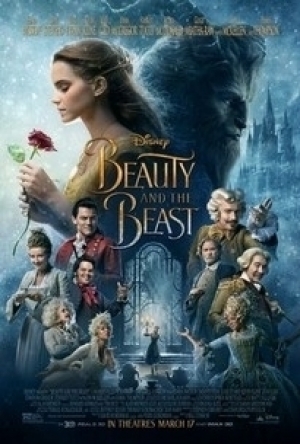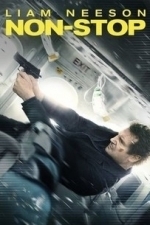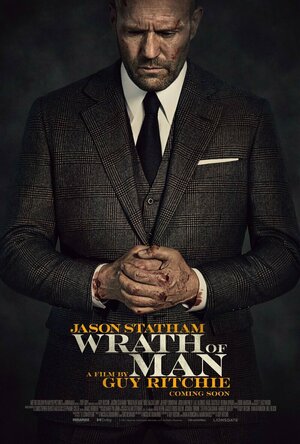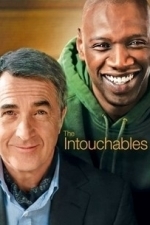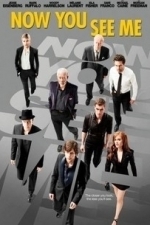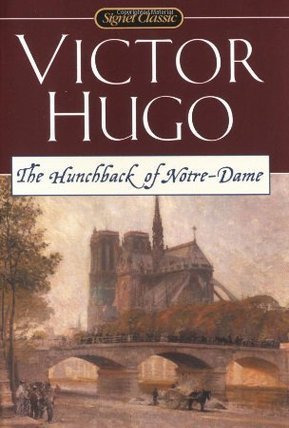Search
Ross (3284 KP) rated The Nutcracker and the Four Realms (2018) in Movies
Nov 5, 2018 (Updated Nov 5, 2018)
Slight variation on the Alice in Wonderland reboot
I'm guessing Disney want to keep going with their live action Princess films, and thought they'd hit gold with the rights to the Nutcracker for a Christmas release. Similar to the 2010 Alice in Wonderland, the film intends to act as a sequel to the original tale of the Nutcracker, where the world has fallen into disarray. Clara is the daughter of the original story's Marie, who has passed away, and looking to open the intriguing present left by her mother she finds herself following a mouse (not a rabbit!) into a strange world. She is introduced to the world her mother was made queen of, though sadly learns that the "fourth realm" (led by Helen Mirren as Mother Ginger) is at war with the other three (among them are realms led by Keira Knightley and an underused Richard E Grant).
Here Disney have taken some liberties as Clara's brother and sister take the roles and names of her mother's siblings in the original, and for no apparent reason the film based on the Russian ballet that was based on the French adaptation of the German fairy tale, is set in London. I can only assume this was to up the Festive quotient, but seems a very odd choice, despite keeping a number of the German themes.
Keira Knightley is very irritating, doing an ear-piercing impression of Queenie from Blackadder.
Neither of the actors playing Clara or the Nutcracker are very good or likeable and you find yourself bored and starting to root for Mother Ginger just to end it.
The film is too long, and drags in large parts, and all three of my kids were restless for a lot of it. And there was a definite lack of large-scale special effects, some impressive scenes but audiences expect spectacles (not 3D glasses, I mean big scenes!) these days and those were lacking.
The most enjoyable scene was the use of ballet to get Clara up to date with the world she found herself in, being quite respectful to the medium it was adapting (though I can't say how authentic it was!).
Here Disney have taken some liberties as Clara's brother and sister take the roles and names of her mother's siblings in the original, and for no apparent reason the film based on the Russian ballet that was based on the French adaptation of the German fairy tale, is set in London. I can only assume this was to up the Festive quotient, but seems a very odd choice, despite keeping a number of the German themes.
Keira Knightley is very irritating, doing an ear-piercing impression of Queenie from Blackadder.
Neither of the actors playing Clara or the Nutcracker are very good or likeable and you find yourself bored and starting to root for Mother Ginger just to end it.
The film is too long, and drags in large parts, and all three of my kids were restless for a lot of it. And there was a definite lack of large-scale special effects, some impressive scenes but audiences expect spectacles (not 3D glasses, I mean big scenes!) these days and those were lacking.
The most enjoyable scene was the use of ballet to get Clara up to date with the world she found herself in, being quite respectful to the medium it was adapting (though I can't say how authentic it was!).
Phillip McSween (751 KP) rated Amélie (2001) in Movies
Sep 30, 2019
Beautiful Movie With a Beautiful Ending
You watch a film like Amelie and you leave thinking, “Some directors just have it figured out more than others.” This movie is pure genius from start to finish, one of my all-time faves for a number of reasons. In this story, Amelie seeks to change the world and make it a better place by helping the people around her.
Acting: 10
While I don’t know many of these actors since this a French film, I was impressed by the multitude of brilliant performances. Audrey Tautou shines as main character Amelie, carrying with her a sincere innocence that is hard not to gravitate towards. From the smaller roles, like Amelie’s parents, to the more pivotal roles, every actor/actress impressed me to no end.
Beginning: 10
Characters: 10
The movie revolves around Amelie’s sensational character. You are captivated by her from her very first moments on screen as a young child. She leads an interesting life that revolves around a number of interesting people. I know I’m being vague, but this is one of those films that’s best experienced when you know very little about it.
Cinematography/Visuals: 10
Conflict: 10
Entertainment Value: 10
Memorability: 10
A classic film is one that breaks the mold giving you something that you won’t find anywhere else. That is very much the case in Amelie as it carries a style all its own. The film is interwoven with grainy flashbacks that are uniquely done in unforgettable fashion. It is hard not to be captivated by these scenes as they unfold. I also appreciate how it dives into the challenges that shy introverts face on a daily basis.
Pace: 10
Plot: 10
Great story with enough diversions to keep you entertained throughout. It is such a simple idea, but is pulled off with complex characters and stories-within-stories. It’s almost disappointing when it ends.
Resolution: 10
Concludes just as it should. It gives you the ending that you hope for without overstaying its welcome. A nice bow on a beautiful present.
Overall: 100
We watch movies for an escape, to be captivated by something better than our own mundane lives. Amelie is magical from beginning to end and the greatest movie I never knew existed until recently. To put it simply, it is damn-near perfect.
Acting: 10
While I don’t know many of these actors since this a French film, I was impressed by the multitude of brilliant performances. Audrey Tautou shines as main character Amelie, carrying with her a sincere innocence that is hard not to gravitate towards. From the smaller roles, like Amelie’s parents, to the more pivotal roles, every actor/actress impressed me to no end.
Beginning: 10
Characters: 10
The movie revolves around Amelie’s sensational character. You are captivated by her from her very first moments on screen as a young child. She leads an interesting life that revolves around a number of interesting people. I know I’m being vague, but this is one of those films that’s best experienced when you know very little about it.
Cinematography/Visuals: 10
Conflict: 10
Entertainment Value: 10
Memorability: 10
A classic film is one that breaks the mold giving you something that you won’t find anywhere else. That is very much the case in Amelie as it carries a style all its own. The film is interwoven with grainy flashbacks that are uniquely done in unforgettable fashion. It is hard not to be captivated by these scenes as they unfold. I also appreciate how it dives into the challenges that shy introverts face on a daily basis.
Pace: 10
Plot: 10
Great story with enough diversions to keep you entertained throughout. It is such a simple idea, but is pulled off with complex characters and stories-within-stories. It’s almost disappointing when it ends.
Resolution: 10
Concludes just as it should. It gives you the ending that you hope for without overstaying its welcome. A nice bow on a beautiful present.
Overall: 100
We watch movies for an escape, to be captivated by something better than our own mundane lives. Amelie is magical from beginning to end and the greatest movie I never knew existed until recently. To put it simply, it is damn-near perfect.
Gareth von Kallenbach (980 KP) rated Dunkirk (2017) in Movies
Jul 11, 2019
In May 1940, as Germany advanced into France, Allied troops found themselves surrounded at the town of Dunkirk with little time to escape. In the distance, the Germans sought to capture or kill each of the nearly 400,000 men. French and British soldiers began the slow process to evacuate using every naval or civilian ship available. Dunkirk examines the heroism involved by everyone on the land, sea, and air in their attempt to get their countrymen home.
When we discuss, reflect, or are taught about World War II, we often think the turning points of the war as the Battle of the Bulge, Leningrad, Midway, or D-Day. In doing this, we overlook moments like Dunkirk. Christopher Nolan exposes how vital this moment was in determining the fate, not only of the war, but the world in Dunkirk.
It is hard to describe what the film is like just from the visuals. It captures you and surrounds you by making the audience feel as though they are witnessing these events from a third-person perspective, as well as, through the eyes of those involved. The film itself is not limited to just the war or a discussion of the circumstances that led up to the war itself. There are no major battles shown, however, the film demonstrates quite vividly the horrors of war, the confusion, the chaos, the brutality, and the fear that each moment might be your last.
Dunkirk, masterfully tells the story of those involved in the evacuation of those troops that found themselves being pursued by Nazi Germany. Each frame will have audiences fearing for the safety of the men on the screen and hoping that they will somehow make it home despite all indications that their fate is sealed. Nolan gives audiences the opportunity to see the events in a multilayered way so that we can understand all of the moving parts involved in this massive undertaking. It renews the appreciation that many of us have for those who fought in World War II and offers a new sense of appreciation for younger generations who are far removed from those events. Most impressive about the film is its ability to be more historically accurate in displaying the different people who actually were fighting. It is not, like Saving Private Ryan, a film that exaggerates American participation in the war to make it look as though the only people fighting were Americans and Nazis. Dunkirk shows how the French, British, and Belgians, of various colors and backgrounds were fighting well before summer of 1944.
The film also pulls of quite an ambitious task by removing the Nazis from the film. This is not to say that there is no German presence in the film, rather, they minimize the focus on the Nazis in order to keep the focus on those evacuating and those involved in assisting with the efforts. In my viewing, I felt that this strengthened the film in adding to the fear by having a faceless enemy, one that could be lurking around the corner or coming around the corner at any moment. This added to the tension to make audiences feel the fear that so many of these young men must have had as they waited to board their ships to get home.
Dunkirk is impressive, emotional, and full of tension. It raises the bar with respect to how historically-based films should be in the representation of events. It does not rely on one linear story to capture the audience. It is an intelligent and overdue homage to the men and women who did all they could to ensure that these men made it home.
When we discuss, reflect, or are taught about World War II, we often think the turning points of the war as the Battle of the Bulge, Leningrad, Midway, or D-Day. In doing this, we overlook moments like Dunkirk. Christopher Nolan exposes how vital this moment was in determining the fate, not only of the war, but the world in Dunkirk.
It is hard to describe what the film is like just from the visuals. It captures you and surrounds you by making the audience feel as though they are witnessing these events from a third-person perspective, as well as, through the eyes of those involved. The film itself is not limited to just the war or a discussion of the circumstances that led up to the war itself. There are no major battles shown, however, the film demonstrates quite vividly the horrors of war, the confusion, the chaos, the brutality, and the fear that each moment might be your last.
Dunkirk, masterfully tells the story of those involved in the evacuation of those troops that found themselves being pursued by Nazi Germany. Each frame will have audiences fearing for the safety of the men on the screen and hoping that they will somehow make it home despite all indications that their fate is sealed. Nolan gives audiences the opportunity to see the events in a multilayered way so that we can understand all of the moving parts involved in this massive undertaking. It renews the appreciation that many of us have for those who fought in World War II and offers a new sense of appreciation for younger generations who are far removed from those events. Most impressive about the film is its ability to be more historically accurate in displaying the different people who actually were fighting. It is not, like Saving Private Ryan, a film that exaggerates American participation in the war to make it look as though the only people fighting were Americans and Nazis. Dunkirk shows how the French, British, and Belgians, of various colors and backgrounds were fighting well before summer of 1944.
The film also pulls of quite an ambitious task by removing the Nazis from the film. This is not to say that there is no German presence in the film, rather, they minimize the focus on the Nazis in order to keep the focus on those evacuating and those involved in assisting with the efforts. In my viewing, I felt that this strengthened the film in adding to the fear by having a faceless enemy, one that could be lurking around the corner or coming around the corner at any moment. This added to the tension to make audiences feel the fear that so many of these young men must have had as they waited to board their ships to get home.
Dunkirk is impressive, emotional, and full of tension. It raises the bar with respect to how historically-based films should be in the representation of events. It does not rely on one linear story to capture the audience. It is an intelligent and overdue homage to the men and women who did all they could to ensure that these men made it home.
Ashley Valencia (5 KP) rated Beauty and the Beast (2017) in Movies
Apr 13, 2019
I Wanted to Like It
The animated Beauty and the Beast is one of my favorite movies to this day so i really wanted to like this film and tried to go in with no expectations.
I knew we were in trouble when Emma Watson started her first song of the film HEAVILY autotuned. The practice used to be that if an actor couldnt sing, they would lip sync and have someone else do the singing voice. This was also common practice for the animated films, one actor for singing and another for spoken lines. I wish they would've gone this route. The autotuning is just so heavy I found it cringey.
The film is gorgeous, a lot of pleasing visuals and effects but the Beast just looks, strange. Not really animalistic. Honestly more like if his face was carved out of a tree.
Despite the singing issue I do think the cast was well chosen. They all do a good job with what they have. Especially the actor playing Gaston. It seemed clear that they weren't 100% sure what to do with the character. At a few points it seemed like they were going to try to make him sympathetic but then they'd fall back on him just being awful. Still the actor did an amazing job and really sold it.
For the most part the plot sticks close to the original film though there are a few new elements, some background on Belle's mom, and new songs.
A few weeks before the film's release the director announced that there was definitely a gay character in the film. There are a few implications that there might be but that's it. I think honestly it would've come across better, he would've been given more credit, if he'd just let it be instead of making a big announcement and patting himself on the back. It would've seemed like a subtle nod to the lgbtq community instead of the false disappointing promise it turned out to be. He wanted the credit without actually putting in the work and it shows.
Overall I just didn't care for it. It's fine. Nothing spectacular. The animated film was definitely better. So I'd say stick with the classic however it is worth watching just to see the different interpretation of the story.
If you want a live action version I would recommend La Belle et la Bete, the 2014 French-Germanic version instead. It's a more interesting and visually stunning version of the story.
I knew we were in trouble when Emma Watson started her first song of the film HEAVILY autotuned. The practice used to be that if an actor couldnt sing, they would lip sync and have someone else do the singing voice. This was also common practice for the animated films, one actor for singing and another for spoken lines. I wish they would've gone this route. The autotuning is just so heavy I found it cringey.
The film is gorgeous, a lot of pleasing visuals and effects but the Beast just looks, strange. Not really animalistic. Honestly more like if his face was carved out of a tree.
Despite the singing issue I do think the cast was well chosen. They all do a good job with what they have. Especially the actor playing Gaston. It seemed clear that they weren't 100% sure what to do with the character. At a few points it seemed like they were going to try to make him sympathetic but then they'd fall back on him just being awful. Still the actor did an amazing job and really sold it.
For the most part the plot sticks close to the original film though there are a few new elements, some background on Belle's mom, and new songs.
A few weeks before the film's release the director announced that there was definitely a gay character in the film. There are a few implications that there might be but that's it. I think honestly it would've come across better, he would've been given more credit, if he'd just let it be instead of making a big announcement and patting himself on the back. It would've seemed like a subtle nod to the lgbtq community instead of the false disappointing promise it turned out to be. He wanted the credit without actually putting in the work and it shows.
Overall I just didn't care for it. It's fine. Nothing spectacular. The animated film was definitely better. So I'd say stick with the classic however it is worth watching just to see the different interpretation of the story.
If you want a live action version I would recommend La Belle et la Bete, the 2014 French-Germanic version instead. It's a more interesting and visually stunning version of the story.

GQ Magazine (UK)
Lifestyle and Magazines & Newspapers
App
Download the October edition of GQ, with exclusive iPad content. All the winners at the 20th annual...
Gareth von Kallenbach (980 KP) rated Non-Stop (2014) in Movies
Jun 19, 2019
Bill Marks (Liam Neeson) is a man with demons. After his daughter fell seriously ill, the former New York police officer began a long descent into alcoholism and emotional distress. His fall was so great; Bill ended up losing his job and fortunately was able to find work as an Air Marshall providing in flight security for commercial routes.
In the new film Non-Stop, Bill is about to take a trans-Atlantic flight to London, and despite his dislike of flying and desire not to have a three day layover in London, reports for duty.
To say Bill is on edge would be an understatement as not only does he top off his coffee with a shot of spirits, he disables the airline smoke alarms so he can sneak a smoke to help calm himself and gather his thoughts.
Despite his issues, Bill is committed to his job and reports for duty and finds himself seated next to a charismatic lady named Jen (Julianne Moore), after she swaps seats with a passenger. Jen is a frequent traveler and noting that Bill seems on edge during takeoff, does her best to help calm him which Bill says will happen once they are airborne as he dislikes take offs.
True to his word, Bill is alert and ready to do his job once the plane is leveled off and en route to London. When a mysterious text arrives telling Bill that unless he deposits 150 million into an account, a passenger will be killed every twenty minutes, Bill swings into action and is determined to get to the bottom of the threat.
The flight crew is eager to put it off as a hoax as they state that a person cannot kill people on a crowded flight without being seen and it is likely just an elaborate hoax. Not convinced, Bill begins to investigate and asks for the passenger manifest to be rechecked and wants the account number he was given traced.
With the first deadline approaching Bill believes he has eliminated the threat when he uncovers a traitor in the midst in the guise of a fellow Air Marshall.
However text messages continue to arrive with instructions and Bill learns from his superiors that the account number given is in Bill’s name. Convinced that there is a viable threat Bill must fight to save the day when the crew, his bosses, and passengers believe he is deranged and actually hijacking the plane himself via an elaborate ruse.
While the film at times stretches credibility, it is for the most part a very tight and suspenseful and enjoyable film. My only issues were the final act at times seemed a bit to Hollywood and conventional for me but thanks to Neeson the film works.
The premise was engaging as was the cast and I was kept guessing as to the true nature of the threat as the film was good at casting suspicions then redirecting them throughout.
Like with the “Taken” films, Neeson is able to take a film that could be a mess in the hands of another actor but through his charisma and strong presence is able to give a character that although flawed is one that an audience can support.
French director Jaume Collet-Serra knows suspense from his part work with films such as “Orphan” and “Mindscape” and he wisely lets the film be a character driven story with action rather than an action film that happens to have characters.
As I said earlier, the final act was what kept the film from being a classic for me, but as it is, there is still plenty of good stuff to make this a film worth catching.
http://sknr.net/2014/02/28/non-stop/
In the new film Non-Stop, Bill is about to take a trans-Atlantic flight to London, and despite his dislike of flying and desire not to have a three day layover in London, reports for duty.
To say Bill is on edge would be an understatement as not only does he top off his coffee with a shot of spirits, he disables the airline smoke alarms so he can sneak a smoke to help calm himself and gather his thoughts.
Despite his issues, Bill is committed to his job and reports for duty and finds himself seated next to a charismatic lady named Jen (Julianne Moore), after she swaps seats with a passenger. Jen is a frequent traveler and noting that Bill seems on edge during takeoff, does her best to help calm him which Bill says will happen once they are airborne as he dislikes take offs.
True to his word, Bill is alert and ready to do his job once the plane is leveled off and en route to London. When a mysterious text arrives telling Bill that unless he deposits 150 million into an account, a passenger will be killed every twenty minutes, Bill swings into action and is determined to get to the bottom of the threat.
The flight crew is eager to put it off as a hoax as they state that a person cannot kill people on a crowded flight without being seen and it is likely just an elaborate hoax. Not convinced, Bill begins to investigate and asks for the passenger manifest to be rechecked and wants the account number he was given traced.
With the first deadline approaching Bill believes he has eliminated the threat when he uncovers a traitor in the midst in the guise of a fellow Air Marshall.
However text messages continue to arrive with instructions and Bill learns from his superiors that the account number given is in Bill’s name. Convinced that there is a viable threat Bill must fight to save the day when the crew, his bosses, and passengers believe he is deranged and actually hijacking the plane himself via an elaborate ruse.
While the film at times stretches credibility, it is for the most part a very tight and suspenseful and enjoyable film. My only issues were the final act at times seemed a bit to Hollywood and conventional for me but thanks to Neeson the film works.
The premise was engaging as was the cast and I was kept guessing as to the true nature of the threat as the film was good at casting suspicions then redirecting them throughout.
Like with the “Taken” films, Neeson is able to take a film that could be a mess in the hands of another actor but through his charisma and strong presence is able to give a character that although flawed is one that an audience can support.
French director Jaume Collet-Serra knows suspense from his part work with films such as “Orphan” and “Mindscape” and he wisely lets the film be a character driven story with action rather than an action film that happens to have characters.
As I said earlier, the final act was what kept the film from being a classic for me, but as it is, there is still plenty of good stuff to make this a film worth catching.
http://sknr.net/2014/02/28/non-stop/
Erika (17789 KP) rated Wrath of Man (2021) in Movies
May 23, 2021 (Updated May 23, 2021)
Guy Ritchie’s newest film, Wrath of Man, is based upon a French film called le Convoyeur, or ‘Cash Truck’. It’s one of the first ‘big’ films that’s only been released in theaters here in the US.
The film was broken into chapters, with different timelines. The opening scene is a violent armored truck robbery, which set an interesting fast-paced tone right off the bat. For me, that pace didn’t stick.
Jason Statham’s character, Hill, or ‘H’ is introduced on his first day working at the same armored truck company a few months later. It’s obvious that Hill isn’t really his name, as he delays his response, and everything is not as it seems. He forms a bond, or something resembling a bond on the surface, with ‘Bullet’, who is his trainer and eventual partner. All the cash truck drivers had very odd nicknames, like Josh Hartnett’s character’s nickname was ‘Boy Sweat’. I don’t believe whatever inside joke it was referring to was ever explained. Of course, per usual, witty banter ensues, which was just kind of gross and crass. Apparently, all the other people in the theater, dudes, thought it was hilarious and it got some laughs. Of course, there was the obligatory ‘Mary Poppins’ comment concerning H’s English accent. I don’t understand why this keeps getting used, the only quip I have ever heard in real life by an American towards someone with an English accent is ‘Masterpiece Theater’.
The pace, as I said, slowed down, until the end of this ‘chapter’, when H stops his armored truck from being robbed by Post Malone. After he takes out all these robbers, he becomes a hero at the company. After a subsequent robbery, all H did was reveal his face, and bam, everyone scatters. Which was really kind of odd. I would have rather watched H tear through them like he did the first batch of robbers, but ok. Bullet then recites the jazzed-up title of this chapter, ‘He’s a dark {expletive] spirit’.
In the subsequent chapters, it becomes clear as to who H is, why the robbery at the beginning was featured, and who ends up being the rat.
Statham’s character in this film was the meanest and most ruthless character he’s ever played. Though, I’m pretty sure the movie could have used a lot more of his wrath. The other characters, portrayed by the likes of Hartnett, Holt McCallany, Andy Garcia, Rob Delany, Eddie Marsan, and Scott Eastwood, didn’t particularly stand out to me.
Overall, I was entertained during the film, I left feeling ambivalent. I think that it just wasn’t enough, maybe there needed to be more violence and more wrath. It almost needed to be more extreme, because in the end, it was neither here nor there.
The film was broken into chapters, with different timelines. The opening scene is a violent armored truck robbery, which set an interesting fast-paced tone right off the bat. For me, that pace didn’t stick.
Jason Statham’s character, Hill, or ‘H’ is introduced on his first day working at the same armored truck company a few months later. It’s obvious that Hill isn’t really his name, as he delays his response, and everything is not as it seems. He forms a bond, or something resembling a bond on the surface, with ‘Bullet’, who is his trainer and eventual partner. All the cash truck drivers had very odd nicknames, like Josh Hartnett’s character’s nickname was ‘Boy Sweat’. I don’t believe whatever inside joke it was referring to was ever explained. Of course, per usual, witty banter ensues, which was just kind of gross and crass. Apparently, all the other people in the theater, dudes, thought it was hilarious and it got some laughs. Of course, there was the obligatory ‘Mary Poppins’ comment concerning H’s English accent. I don’t understand why this keeps getting used, the only quip I have ever heard in real life by an American towards someone with an English accent is ‘Masterpiece Theater’.
The pace, as I said, slowed down, until the end of this ‘chapter’, when H stops his armored truck from being robbed by Post Malone. After he takes out all these robbers, he becomes a hero at the company. After a subsequent robbery, all H did was reveal his face, and bam, everyone scatters. Which was really kind of odd. I would have rather watched H tear through them like he did the first batch of robbers, but ok. Bullet then recites the jazzed-up title of this chapter, ‘He’s a dark {expletive] spirit’.
In the subsequent chapters, it becomes clear as to who H is, why the robbery at the beginning was featured, and who ends up being the rat.
Statham’s character in this film was the meanest and most ruthless character he’s ever played. Though, I’m pretty sure the movie could have used a lot more of his wrath. The other characters, portrayed by the likes of Hartnett, Holt McCallany, Andy Garcia, Rob Delany, Eddie Marsan, and Scott Eastwood, didn’t particularly stand out to me.
Overall, I was entertained during the film, I left feeling ambivalent. I think that it just wasn’t enough, maybe there needed to be more violence and more wrath. It almost needed to be more extreme, because in the end, it was neither here nor there.
JT (287 KP) rated The Intouchables (2012) in Movies
Mar 17, 2020
Beautifully acted (2 more)
Well-directed
Heart warming
A foreign film that everyone should watch
I don’t think there has been one foreign film that I have watched that I have not liked or one that has not moved me in some way. It’s good to be able to pull away from mainstream Hollywood films and delve into another language.
This time I went for a heartwarming tale about a French aristocrat and a man from the projects who form an unlikely bond. Driss (Omar Sy) struggles in life, he lives at home with a large extended family and does his best to make ends meet.
Looking to show the benefits office that he is trying to find work so he can claim is not the easiest way to make money. On the other side, Philippe (François Cluzet) is dependent on everyone in his life, since a paragliding accident left him paralyzed from the neck down.
During an interview process to find his next carer in which Driss applies for the pair seemingly hit it off, and so begins a wonderful and awe-inspiring story. Driss who has never really needed to take responsibility after being pushed out on the street by his Aunt finds a new companion in Philippe.
Philippe too has found someone to share a smile with again, a laugh and most importantly someone that does not pity him which he feels is the most important. There is no particular story in this to adhere to, it’s about the growing relationship between two different people from opposite ends of the financial spectrum and how important they realise they are to each other.
Driss has to come to grips with the lifestyle that Philippe leads, how he has to be on call at every hour of the day, but living inside the large Parisian mansion he gets a taste of what his life is like to be wealthy and to seemingly have it all.
When Driss discovers that Philippe has an epistolary relationship with a woman he forces him to speak to her on the phone as opposed to the continual writing of letters, even going so far as to set him up on a date. Dris and Philippe force each other to step out of their comfort zones and to realize there is so much more in life.
The film’s serious nature is broken in parts by some beautiful light-hearted comedy, Driss realizing what the rubber gloves are for, and that foot cream is not shampoo. It’s been a while since I genuinely laughed out loud at any film.
When Philippe and Driss decide it is time to part ways there is a deflating sense of sadness that their relationship is over, but both men soon discover that they need each other in their life more than ever. Based on a true story it’s a brilliantly written and well-directed film that tugs at the heartstrings but will have you smiling all the way through.
This time I went for a heartwarming tale about a French aristocrat and a man from the projects who form an unlikely bond. Driss (Omar Sy) struggles in life, he lives at home with a large extended family and does his best to make ends meet.
Looking to show the benefits office that he is trying to find work so he can claim is not the easiest way to make money. On the other side, Philippe (François Cluzet) is dependent on everyone in his life, since a paragliding accident left him paralyzed from the neck down.
During an interview process to find his next carer in which Driss applies for the pair seemingly hit it off, and so begins a wonderful and awe-inspiring story. Driss who has never really needed to take responsibility after being pushed out on the street by his Aunt finds a new companion in Philippe.
Philippe too has found someone to share a smile with again, a laugh and most importantly someone that does not pity him which he feels is the most important. There is no particular story in this to adhere to, it’s about the growing relationship between two different people from opposite ends of the financial spectrum and how important they realise they are to each other.
Driss has to come to grips with the lifestyle that Philippe leads, how he has to be on call at every hour of the day, but living inside the large Parisian mansion he gets a taste of what his life is like to be wealthy and to seemingly have it all.
When Driss discovers that Philippe has an epistolary relationship with a woman he forces him to speak to her on the phone as opposed to the continual writing of letters, even going so far as to set him up on a date. Dris and Philippe force each other to step out of their comfort zones and to realize there is so much more in life.
The film’s serious nature is broken in parts by some beautiful light-hearted comedy, Driss realizing what the rubber gloves are for, and that foot cream is not shampoo. It’s been a while since I genuinely laughed out loud at any film.
When Philippe and Driss decide it is time to part ways there is a deflating sense of sadness that their relationship is over, but both men soon discover that they need each other in their life more than ever. Based on a true story it’s a brilliantly written and well-directed film that tugs at the heartstrings but will have you smiling all the way through.
Gareth von Kallenbach (980 KP) rated Now You See Me (2013) in Movies
Aug 7, 2019
When you were little and you saw your very first magic show, you were probably amazed just by the simple action of a magician waving his magic wand and pulling a rabbit out of his hat. The only explanation you needed was that it was magic.
Not knowing that “the closer you look, the less you see as you become older you become less and less convinced that magic exists.
From French director Louis Leterrier who has brought us films like “The Transporter” and ” Unleashed” comes an “Ocean’s Eleven” style film about four magicians who pull off one of the biggest heists the world has ever seen by using magic.
Calling themselves The Four Horseman, four magicians with very different abilities come together as one to pull off something no other magician has ever attempted.
The leader of the pack is J. Daniel Atlas (Jesse Eisenberg), who is a master at sleight-of-hand and blatant arrogance. A mentalist who specializes in hypnosis and is no stranger to being devious himself is Merritt McKinney (Woody Harrelson). The very talented pickpocket Jack Wilder (Dave Franco) not only steals the audience’s hearts but also can pick a lock blindfolded if he had to.
Last but by no means least is Henley Reeves (Isla Fisher), the sexy escape artist who can even escape a tank full of piranhas without a scratch.
The story follows The Four Horseman embarking on a journey of teleporting and robbing a Parisian bank and reining it over the cheering Las Vegas audience at their first venue.
They don’t stop there. There show takes them from Vegas to the renewed city of New Orleans and then to New York where the grand finally takes place whilst spreading the wealth of their heists to the deserving audience members in grand Robin Hood fashion.
This film is excellent! It doesn’t leave you hanging and answers all your questions. The elaborate tricks performed proved to be very entertaining and exciting!
A neat touch was adding a woman to the mix as you don’t really see any women magicians out there other than the assistants who get sawed in half.
The cast was great and had great chemistry however I would have liked to see a bit more of character backstory. Morgan Freeman, Michael Caine and Mark Ruffalo are also a part of the seemingly big cast. The special effects were not only entertaining but extremely appealing to the eye.
Though the storyline is a little scatterbrained it is anything but a bore and leaves you wanting to experience more. After seeing the film, I had an overwhelming need to watch other magician movies like “The Great Houdini”, “The Prestige”, and “The Illusionist”. It also brought back those same feelings I had as a child experiencing the magic and mystery a true magician can provide. This film left me wanting to see it for a second time.
Not knowing that “the closer you look, the less you see as you become older you become less and less convinced that magic exists.
From French director Louis Leterrier who has brought us films like “The Transporter” and ” Unleashed” comes an “Ocean’s Eleven” style film about four magicians who pull off one of the biggest heists the world has ever seen by using magic.
Calling themselves The Four Horseman, four magicians with very different abilities come together as one to pull off something no other magician has ever attempted.
The leader of the pack is J. Daniel Atlas (Jesse Eisenberg), who is a master at sleight-of-hand and blatant arrogance. A mentalist who specializes in hypnosis and is no stranger to being devious himself is Merritt McKinney (Woody Harrelson). The very talented pickpocket Jack Wilder (Dave Franco) not only steals the audience’s hearts but also can pick a lock blindfolded if he had to.
Last but by no means least is Henley Reeves (Isla Fisher), the sexy escape artist who can even escape a tank full of piranhas without a scratch.
The story follows The Four Horseman embarking on a journey of teleporting and robbing a Parisian bank and reining it over the cheering Las Vegas audience at their first venue.
They don’t stop there. There show takes them from Vegas to the renewed city of New Orleans and then to New York where the grand finally takes place whilst spreading the wealth of their heists to the deserving audience members in grand Robin Hood fashion.
This film is excellent! It doesn’t leave you hanging and answers all your questions. The elaborate tricks performed proved to be very entertaining and exciting!
A neat touch was adding a woman to the mix as you don’t really see any women magicians out there other than the assistants who get sawed in half.
The cast was great and had great chemistry however I would have liked to see a bit more of character backstory. Morgan Freeman, Michael Caine and Mark Ruffalo are also a part of the seemingly big cast. The special effects were not only entertaining but extremely appealing to the eye.
Though the storyline is a little scatterbrained it is anything but a bore and leaves you wanting to experience more. After seeing the film, I had an overwhelming need to watch other magician movies like “The Great Houdini”, “The Prestige”, and “The Illusionist”. It also brought back those same feelings I had as a child experiencing the magic and mystery a true magician can provide. This film left me wanting to see it for a second time.
The Bandersnatch (199 KP) rated The Hunchback of Notre-Dame in Books
Nov 7, 2019
The Hunchback of Notre Dame is set in 1829's Paris, France where the gypsy Esmeralda (Born Agnes) captures the hearts of several men including captain Phoebus and Pierre Gringoire but especially Quasimodo the bell ringer and his guardian the Archdeacon Claude Frollo.
Frollo orders Quasimodo to bring Esmeralda to him and after a lot of chaos where the guards under Phoebus capture Quasimodo, Gringoire is knocked out and only rescued from hanging when Esmeralda saves him with promise of marriage and Quasimodo flogged and placed on a pillory for several hours of public exposure. When Esmeralda is accused of attempted murder Quasimodo helps by giving her space in the cathedral of Notre Dame under law of sanctuary. Frollo finds out that the court of parliament has voted the removal of Esmeralda's right for sanctuary and orders her to be taken and killed. Clopin the head of the gypsies hears this and leads a rescue party to help Esmeralda. During the chaos Quasimodo mistakes who is wanting to help the Gypsy he loves and ends up in aiding in her arrest. Frollo after failing to win her love betrays Esmeralda and sends her to be hung. Frollo laughs as Esmeralda dies and is pushed from the top of the Cathedral by Quasimodo. Quasimodo dies of starvation after joining Esmeralda's body in the cemetery.
Victor Hugo began writing the book in 1829The novels original title was Notre Dame de Paris, it was largely to make his contemporaries more aware of the value of the Gothic architecture, Notre Dame Cathedral had been in disrepair at the time and along with other buildings which were neglected and often destroyed to be replaced by new buildings or defaced by replacement of parts of buildings in a newer style. During the summer of 1830 Gosselin demanded that Hugo complete the book by February 1831, Hugo -starting in September 1830- worked non stop on the book finishing it six months later. Several ballets, comics, TV show, theatre, music, musical theatre and films have been inspired by The Hunchback of Notre Dame most notably has been the 1996 Walt Disney animated movie of the same name.
I think that The Hunchback of Notre Dame is a very prolific book which promotes the fact that it doesn't matter what you look like on the outside, its how you deal with people and what is on the inside that counts. The books portrayal of the romantic era as an extreme through the architecture, passion and religion as well as the exploration of determinism, revolution and social strife adds to the ultimately magical make up of the book. I believe that most people would see themselves in the position of Quasimodo, Esmeralda and Phoebus rather than that of Frollo. I know I certainly wouldn't see myself otherwise.
Victor Marie Hugo was born on February 26th 1802 in Besançon. eastern Franche-Combe as the third son of Joseph Leopold Sigisbert Hugo (1774-1828) and Sophie Trebuchet (1772-1821). Victor was a French poet, novelist and dramatist of the romantic movement, he's also considered one of the greatest and best known French writers. Victors childhood was a period of national political turmoil with Napoleon being proclaimed Emperor two years after he was born and the Bourbon monarchy was restored before his 13th birthday. His parents held vastly different political and religious views which prompted a brief separation in 1803, during that time Hugo's mother dominated his education and upbringing. Hugos work reflected her devotion to king and faith. However during the events leading up to France's 1848 revolution, Hugos work changed to that of Republicanism and free thought. Hugo went on to married to his childhood sweetheart Adele Foucher in 1822 and they had five children.
Victor Hugo's works hold a vast collection of poetry, novels and music. His first Novel Han D'Islande was published in 1823 and he published five volumes of poetry between 1829 and 1840 which cemented his reputation as a great elagiac and lyric poet. Hugos first mature work of fiction was published in February 1829 by Charles Gosselin without his name attached, this would infuse with his later work Le Dernier Jour d'un Condamne (The last day of a Condemned man) and go on to not only influence other writers including Charles Dickens and Albert Camus, and be a precursor to Hugo's work Les Miserables published in 1862.
After three attempts Hugo was finally elected to Academie francaise in 1841and in 1845 King Louis-Phillipe elevated him to the peerage and in 1848 he was elected to the national assembly of the second republic. When Louis Napoleon the 3rd seized power in 1851 Hugo openly declared him a traitor to France then relocated to Brussels, Jersey (where he was thrown out of for supporting a paper criticising Queen Victoria) and ending up in guernsey where he remained an exile until 1870. after returning to France a hero in 1870 Hugo spent the rest of his life writing and just living and died from pneumonia on may 22nd 1885 at the age of 83. He was given a state funeral by degree of president Jules Grevy, more than two million people joined his funeral procession in Paris which went form the Arc Du Triomphe to the Pantheon where he was consequently buried, he shared a crypt with Alexandre Dumas and Emile Zola. Most French towns and cities have streets named after him.
Victor Hugo in my opinion is one of those naturally born creative souls who had felt compelled to both write and at least try to make the world a better place. He definitely attempted to do so from the positions he accumulated in his life time and despite this the three mistresses he had in his later years definitely shows that his love life left something to be desired.
And there you have it a book for all the ages, its definitely under the banner of AWESOME!!!.
Frollo orders Quasimodo to bring Esmeralda to him and after a lot of chaos where the guards under Phoebus capture Quasimodo, Gringoire is knocked out and only rescued from hanging when Esmeralda saves him with promise of marriage and Quasimodo flogged and placed on a pillory for several hours of public exposure. When Esmeralda is accused of attempted murder Quasimodo helps by giving her space in the cathedral of Notre Dame under law of sanctuary. Frollo finds out that the court of parliament has voted the removal of Esmeralda's right for sanctuary and orders her to be taken and killed. Clopin the head of the gypsies hears this and leads a rescue party to help Esmeralda. During the chaos Quasimodo mistakes who is wanting to help the Gypsy he loves and ends up in aiding in her arrest. Frollo after failing to win her love betrays Esmeralda and sends her to be hung. Frollo laughs as Esmeralda dies and is pushed from the top of the Cathedral by Quasimodo. Quasimodo dies of starvation after joining Esmeralda's body in the cemetery.
Victor Hugo began writing the book in 1829The novels original title was Notre Dame de Paris, it was largely to make his contemporaries more aware of the value of the Gothic architecture, Notre Dame Cathedral had been in disrepair at the time and along with other buildings which were neglected and often destroyed to be replaced by new buildings or defaced by replacement of parts of buildings in a newer style. During the summer of 1830 Gosselin demanded that Hugo complete the book by February 1831, Hugo -starting in September 1830- worked non stop on the book finishing it six months later. Several ballets, comics, TV show, theatre, music, musical theatre and films have been inspired by The Hunchback of Notre Dame most notably has been the 1996 Walt Disney animated movie of the same name.
I think that The Hunchback of Notre Dame is a very prolific book which promotes the fact that it doesn't matter what you look like on the outside, its how you deal with people and what is on the inside that counts. The books portrayal of the romantic era as an extreme through the architecture, passion and religion as well as the exploration of determinism, revolution and social strife adds to the ultimately magical make up of the book. I believe that most people would see themselves in the position of Quasimodo, Esmeralda and Phoebus rather than that of Frollo. I know I certainly wouldn't see myself otherwise.
Victor Marie Hugo was born on February 26th 1802 in Besançon. eastern Franche-Combe as the third son of Joseph Leopold Sigisbert Hugo (1774-1828) and Sophie Trebuchet (1772-1821). Victor was a French poet, novelist and dramatist of the romantic movement, he's also considered one of the greatest and best known French writers. Victors childhood was a period of national political turmoil with Napoleon being proclaimed Emperor two years after he was born and the Bourbon monarchy was restored before his 13th birthday. His parents held vastly different political and religious views which prompted a brief separation in 1803, during that time Hugo's mother dominated his education and upbringing. Hugos work reflected her devotion to king and faith. However during the events leading up to France's 1848 revolution, Hugos work changed to that of Republicanism and free thought. Hugo went on to married to his childhood sweetheart Adele Foucher in 1822 and they had five children.
Victor Hugo's works hold a vast collection of poetry, novels and music. His first Novel Han D'Islande was published in 1823 and he published five volumes of poetry between 1829 and 1840 which cemented his reputation as a great elagiac and lyric poet. Hugos first mature work of fiction was published in February 1829 by Charles Gosselin without his name attached, this would infuse with his later work Le Dernier Jour d'un Condamne (The last day of a Condemned man) and go on to not only influence other writers including Charles Dickens and Albert Camus, and be a precursor to Hugo's work Les Miserables published in 1862.
After three attempts Hugo was finally elected to Academie francaise in 1841and in 1845 King Louis-Phillipe elevated him to the peerage and in 1848 he was elected to the national assembly of the second republic. When Louis Napoleon the 3rd seized power in 1851 Hugo openly declared him a traitor to France then relocated to Brussels, Jersey (where he was thrown out of for supporting a paper criticising Queen Victoria) and ending up in guernsey where he remained an exile until 1870. after returning to France a hero in 1870 Hugo spent the rest of his life writing and just living and died from pneumonia on may 22nd 1885 at the age of 83. He was given a state funeral by degree of president Jules Grevy, more than two million people joined his funeral procession in Paris which went form the Arc Du Triomphe to the Pantheon where he was consequently buried, he shared a crypt with Alexandre Dumas and Emile Zola. Most French towns and cities have streets named after him.
Victor Hugo in my opinion is one of those naturally born creative souls who had felt compelled to both write and at least try to make the world a better place. He definitely attempted to do so from the positions he accumulated in his life time and despite this the three mistresses he had in his later years definitely shows that his love life left something to be desired.
And there you have it a book for all the ages, its definitely under the banner of AWESOME!!!.
